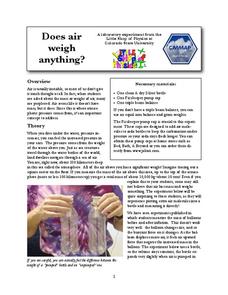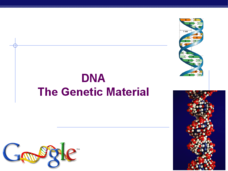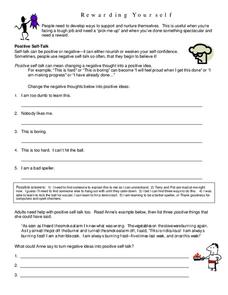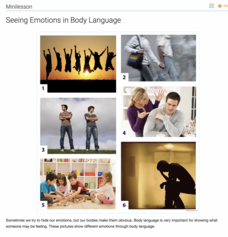Chymist
Earth Science
Explore the consistency of the earth's layers and soil through modeling. By conducting an engaging experiment, learners develop a model for the earth's layers and a soil profile using edible materials. Each material is chosen based on...
Alpena-Montmorency-Alcona Educational Service District
4th Grade Personal Narrative
Throughout 10 lessons, fourth graders learn how to plan, organize, write, and edit their own personal narratives. In the beginning, young writers come up with ideas of personal experiences and the emotions linked with those experiences....
Curated OER
Organizing by Writing
Middle schoolers analyze how to use writing for generating and organizing their thoughts before communicating them. They use the questions on the first handout to organize a three-minute introduction of themselves to their small group....
Cornell University
Nano What?
The size of a nanoparticle is difficult for pupils to grasp. A hands-on experiment is designed to give your classes perspective. Learners analyze different sports drinks for the content of electrolytes as an introduction to nanoscale....
Colorado State University
Does Air Weigh Anything?
Can you feel the weight of the air on your shoulders? Your classes may not believe that air has weight. A straightforward experiment asks individuals to weigh a bottle before and after adding air. Their results may surprise them!
Curated OER
Biotechnology Laboratory Research
Young scholars participate in an extended laboratory research to experience how scientific information is obtained, upon which we build scientific knowledge and understanding.
Curated OER
Connecting with Your Feelings
As part of a therapeutic and restorative exercise, pupils use worksheets to recall experiences and explore their reactions to major feelings, from anxiety and anger to joy and love.
Curated OER
The Good and Bad Bacteria
Students are able to name one kind of harmful bacteria and why it hurts us and also name one kind of helpful bacteria and how we use it. They describe the process of growing bacterial cultures in a lab. Students create a reasonable...
Crafting Freedom
Creating Original Historical Fiction Using Henry "Box" Brown's Narrative and Runaway Slave Ads
Young historians discover the experiences of runaway slaves after reading the brief biography and narrative excerpt of Henry "Box" Brown, who escaped slavery by having himself shipped away in a crate and popularized his flight in a...
Mr. Science
The Scientific Method
First, ask a question and then, do research. Next, form a hypothesis, and conduct an experiment. Make observations, gather and analyze data, and then state a conclusion based on the results. This is the scientific method, and here is a...
Curated OER
Sink or Float?
Students investigate whether different objects sink or float in water using the Scientific Method. They listen to the book "Christopher Columbus" by Stephen Krensky, identify the steps of the Scientific Method, conduct the sink or float...
J. Paul Getty Trust
Looking and Learning in the Art Museum — Lesson 3
Curator, artist, art handler, archivist, conservator-restorer, guide. Who would have thought there were so many different kinds of museum professionals? After a visit to an art museum, class members reflect on the role of the museum in...
Curated OER
Conflict Resolution
A thought-provoking language arts activity prompts learners to respond to seven questions that deal with sociology. Additionally, they consider topics regarding animal rights. Sure to spark some engaging conversations in your class!
Curated OER
Orienting a Photovoltaic Cell
By mounting a light bulb on a stand and a PV cell on another, physics apprentices experiment with the angle of incidence. Their goal is to determine the optimum angle for collecting solar energy. The use of a scientific calculator is...
Curated OER
DNA: The Genetic Material
The various experiments and processes that were completed in the 20th century to further our understanding of DNA are summarized here. There are wonderful slides to popularize the scientists who dedicated their professional life to...
Curated OER
Using Process Drama in the Language Arts Classroom
Using the tools of process drama to create authentic learning experiences for students.
Center for the Advancement of Ethics and Character
Charlotte's Web: A Story About Friendship
Strengthen the bonds of friendship within your class with a reading of E.B. White's award-winning novel, Charlotte's Web. Focusing on the unique characters in the story and the relationships they develop, young readers draw from their...
Curated OER
English Learner Types - Quiz Lesson
An interesting quiz awaits your English Language Learners. In it, they answer ten questions pertaining to why they are learning English, and how they think they can best learn the language. Some thought-provoking discussion should ensue...
Curated OER
The Dragon of Brog: Stereotyping and Discrimination Social Justice Lesson Plan
Stereotyping and discrimination are explored in this social justice activity. Students listen to the book Dragon of Brog, in which mythical characters experience discrimination. Then, they sculpt a magical character out of plasticene...
Curated OER
Sentence Fragments
As middle and high schoolers experiment with their writing styles, it's easy to slip in a few accidental sentence fragments. After reading a full-page of information regarding how to identify and avoid sentence fragments, learners...
University of Washington
Rewarding Yourself
Everyone experiences negative self-talk from time to time, but how can youngsters learn to take it easy on themselves? Use an activity that focuses on talking positively to oneself, including giving yourself compliments and spending time...
College of the Canyons
Free Verse
Free verse poetry is often regarded as poetry without structure, but in reality, it is a poetic form that adheres to its own poet's thought and breath patterns. Delve into the rules and famous examples of free-verse poetry with a short...
Planet e-Book
Dubliners
The Dubliners contains 15 short stories all bound in one book. The stories begin with narration by young children, and as they progress, so do the ages of the narrators. The author, James Joyce, focuses most stories on characters that...
Thoughtful Learning
Seeing Emotions in Body Language
Scholars test their skills of reading body language with a collaborative learning experience that focuses on showing and identifying emotions. Pairs take turns acting out an emotion, one uses body language while the other guesses what...

























